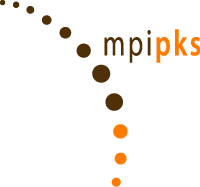
Novel Paradigms in Many-Body Physics from Open Quantum Systems
Workshop Report
Strongly-correlated open systems generically violate basic paradigms of many-body physics in thermal equilibrium and therefore require novel concepts and methods to be studied. The goal of this workshop was to provide an overview of the state-of-the-art of this field, both in terms of theoretical approaches as well as experimental realizations. To achieve this goal, we asked 6 of the invited speakers to deliver introductory lectures of 2-3 hours, and limited the other 10 invited and contributed talks to 30 minutes. The total number of participants was 80.
The workshop was dealing with a novel direction of research that crosses different fields, ranging from quantum optics to condensed matter. Consequently, one of the our main goals was to provide an overview of the field, especially for young students who are interested in exploring this topic during their graduate and post-graduate studies. Thanks to the growing interest around the themes of the workshop, we expect that in the long term, this will lead to a international scientific community working on this topic. In this sense, we believe the PhD students (33 in number) were probably the most important participants, along with the 6 lecturers, who provided the broad introductions to different aspects of the field, namely Alberto Amo (C2N, Marcoussis), Andrew Daley (University of Strathclyde), Michael Fleischhauer (University of Kaiserslautern), Jonathan Keeling (University of St. Andrews), Toma Prosen (University of Ljubljana), Jonathan Simon (University of Chicago).
As said above, the workshop was especially addressed to young researchers entering the field. We had several Post-Docs and junior PIs among the speakers who provided very clear presentations and represented the large number of diverse directions emerging in this area. We also had more than 60 posters mostly from PhD students presenting the results of their work so far. The wo poster sessions were organized in the evenings, and provided the basis for intensive and lively discussions among scholars from different areas.
We believe the main result of the workshop was the success of the introductory lectures, especially among the young researchers. The lecturers had the difficult task to coordinate among one another and bridge between different areas of research, and they did a very good job. We think this was a unique opportunity for participants, who could additionally interact with people from different areas based on the common denominator of quantum many-body open systems.
